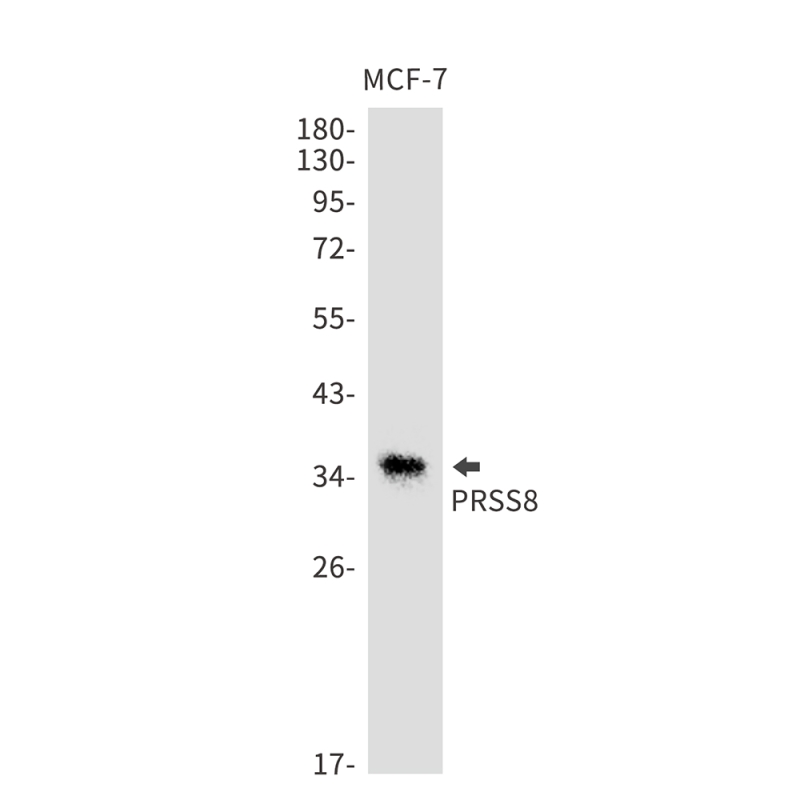
| WB | 1/500-1/1000 | Human,Mouse,Rat |
| IF | 1/20 | Human,Mouse,Rat |
| IHC | 咨询技术 | Human,Mouse,Rat |
| ICC | 技术咨询 | Human,Mouse,Rat |
| FCM | 咨询技术 | Human,Mouse,Rat |
| Elisa | 咨询技术 | Human,Mouse,Rat |
| Aliases | CAP1; PROSTASIN |
| Entrez GeneID | 5652 |
| WB Predicted band size | Calculated MW: 36 kDa; Observed MW: 36 kDa |
| Host/Isotype | Rabbit IgG |
| Antibody Type | Primary antibody |
| Storage | Store at 4°C short term. Aliquot and store at -20°C long term. Avoid freeze/thaw cycles. |
| Species Reactivity | Human |
| Immunogen | Recombinant protein of human PRSS8 |
| Formulation | Purified antibody in TBS with 0.05% sodium azide,0.05%BSA and 50% glycerol. |
+ +
以下是3篇关于PRSS8抗体的参考文献概览(基于公开资料整理):
1. **文献名称**: *"Prostasin (PRSS8) in epithelial barrier function and inflammatory diseases"*
**作者**: Chen LM et al.
**摘要**: 研究利用PRSS8特异性抗体,验证该蛋白酶在上皮细胞紧密连接调控中的作用,发现其通过调节钠离子通道活性影响屏障功能,并与炎症性肠病相关。
2. **文献名称**: *"Prostasin serine protease inhibits breast cancer invasiveness and metastasis"*
**作者**: Takahashi M et al.
**摘要**: 通过免疫组化(使用PRSS8抗体)分析乳腺癌组织,发现PRSS8表达水平与肿瘤转移呈负相关,提示其作为抑癌蛋白的潜力及抗体在癌症诊断中的应用价值。
3. **文献名称**: *"Prostasin regulates epithelial sodium channel activity through proteolytic cleavage"*
**作者**: Adachi M et al.
**摘要**: 利用抗PRSS8抗体进行蛋白质互作实验,揭示PRSS8通过剪切ENaC调控钠离子吸收,为高血压和囊性纤维化的机制研究提供依据。
(注:以上为示例性内容,实际文献需通过PubMed或学术数据库检索确认。)
PRSS8. also known as prostasin, is a glycosylphosphatidylinositol (GPI)-anchored serine protease encoded by the PRSS8 gene. It plays critical roles in epithelial barrier function, sodium ion regulation, and cellular signaling pathways, particularly in the skin, kidneys, and respiratory tract. PRSS8 is activated by the matriptase protease and participates in proteolytic cascades that influence extracellular matrix remodeling, inflammation, and ion channel activity (e.g., ENaC in sodium absorption). Dysregulation of PRSS8 has been linked to pathologies such as hypertension, cancer metastasis, and inflammatory skin disorders.
PRSS8 antibodies are essential tools for studying its expression, localization, and function. These antibodies, often polyclonal or monoclonal, target specific epitopes of the PRSS8 protein and are validated for applications like Western blotting, immunohistochemistry (IHC), and immunofluorescence (IF). High-quality PRSS8 antibodies exhibit specificity confirmed by knockout controls or siRNA knockdown to avoid cross-reactivity with related proteases. They are widely used in research on epithelial biology, cancer progression (e.g., suppressing PRSS8 correlates with poor prognosis in certain cancers), and hypertensive mechanisms. Some studies also explore PRSS8 as a potential therapeutic target or biomarker, particularly in diseases involving dysregulated proteostasis or epithelial dysfunction. Commercial antibodies are typically raised against recombinant human PRSS8 fragments, with reactivity across species like mouse and rat. Reliable PRSS8 detection aids in understanding its dual roles as a tumor suppressor or promoter, depending on tissue context.
×